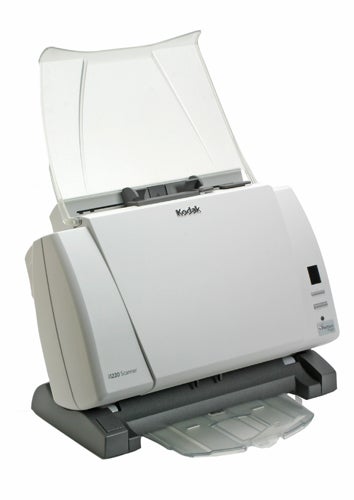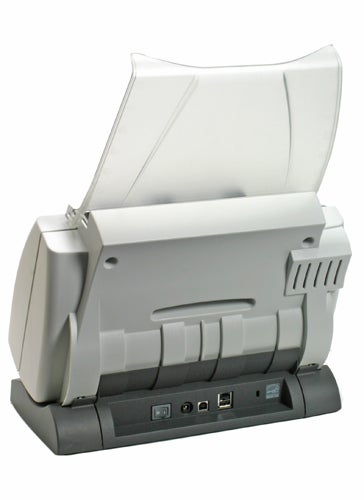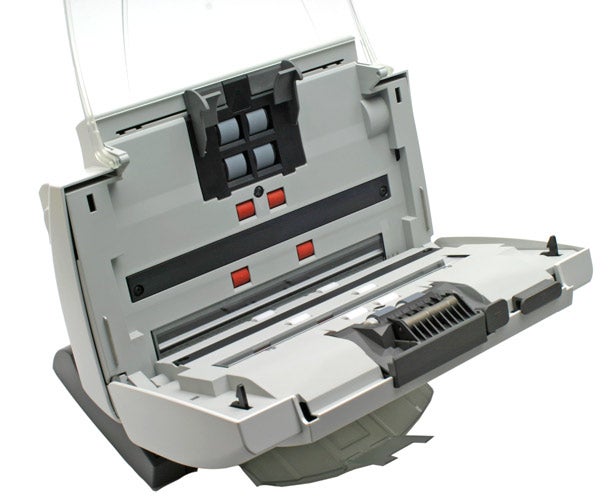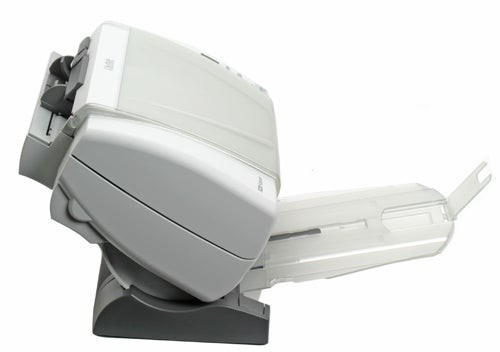Kodak i1220 Scanner Review
Kodak i1220 Scanner
If you're drowning under a sea of paperwork, maybe it's time to go digital.

Verdict
Key Specifications
- Review Price: £971.73
Back in the days when we were all naïve about technology and the benefits it would bring, there was a band of crazy folk going about telling us that the end of paper was nigh. Electronic communications would see the death of letter writing, postmen would all lose their jobs and there would be a lot less litter. The fools.
The reality of the modern PC and Windows-equipped office is very different. Email actually generates more waste paper as office workers needlessly print emails out to read them, while the low cost of printing in general means that companies can afford to bury us all in mountains of junk mail.

Kodak is one company that seems to be fighting the good fight for the seemingly lost cause of the paperless office. Its compact i1220 scanner is aimed turning documents from physical to electronic format. But what’s this, it doesn’t print? It doesn’t fax? It doesn’t make the perfect cappuccino? Why on earth would you want to clutter your desk with such a limited device?
Admittedly it’s a bit of a one trick pony compared to the plethora of all-singing, all-dancing multifunction devices on the market at the moment. But make no mistake, this is no lightweight consumer device. The i1220 is the Glenn McGrath of the scanner world – it may not be the most exciting or glitzy of devices, but its one-track-mind, business oriented approach is deceptively effective and one that really delivers the goods.

For starters this device can scan a lot of stuff, really quickly. If you’ve ever tried to digitise a multi-page document, you’ll know exactly what I’m talking about here. Feed the i1220 a stack of A4 documents and it will devour them in a matter of seconds. Officially, Kodak claims a scan speed of up to 30 pages per minute in colour and I would not disagree with this. In fact I managed to get it to scan quicker, with 34 pages summarily dispatched in 58 seconds at 300dpi. Even more impressively, this device scans both sides of your documents simultaneously giving a total potential scanning speed of over 64 pages a minute. Seriously impressive, though it’s a lot slower at higher a resolution. Scanning at 600dpi the same 34 page document took 10 minutes 50 seconds to scan.
The i1220 is also extremely versatile in the paper types it can handle. In fact you can chuck pretty much anything bar bog paper at it and it will cope fine (according to the spec sheet it can feed 34g/m2 to 413g/m2). That means you can scan everything from a stack of business cards to a sheaf of those flimsy delivery dockets that seem to be printed on tracing paper. For really thick media, the body of the scanner flips back to an almost horizontal position so your card won’t snag on the desk when it emerges onto the output tray.

Perhaps the most impressive thing about the i1220, however, is its ease of use. Even my gran could use it, and she’s not exactly what you’d call a silver surfer. After you’ve loaded the tray up, all you need to do is right click the i1220 icon in the system tray and pick an option – there are straight-to-jpg or PDF and copy to printer options to choose from – and off it goes. No fiddly settings to master, no pre-scanning or rescanning to do – the i1220 does everything for you, first time, from automatically cropping and straightening pages to applying automatic adjustments so documents are easier to OCR.
What’s really clever here, though, is that if you choose to output to PDF the i1220 scans and recognises any text in the documents automatically, producing fully searchable PDFs without the need for you to do anything apart from stick your documents in the input tray and pick an option. Even problematic documents such as those with coloured backgrounds are dealt with quickly and without fuss and turned into searchable documents.

It’s not perfect, however. The output tray isn’t the greatest piece of design, and quickly starts shed pages all over the floor if you don’t keep an eye on things. Another problem with it is that it doesn’t completely fold away, which means it takes up more room on a desk than first impressions might suggest.
”’Verdict”’
These are minor niggles, however. All in all, the Kodak i1220 does exactly what it says on the tin, and it does it very effectively too. It will let you scan and digitise lots of different types of documents extremely quickly, and it’s almost as easy to use as a photocopier.
If your office is really serious about cutting down on all of that paper, however, or you want to archive a large volume of paper records in, erm, record time, or you’re simply looking for something to take the sweat out of a job that’s currently taking an absolute age to carry out then look no further.
The only hurdle with the i1220 may be its price, which at a whopping £971.73, is enough to make you choke on your cornflakes, whatever your business scanning needs.
Trusted Score
Score in detail
-
Value 6

